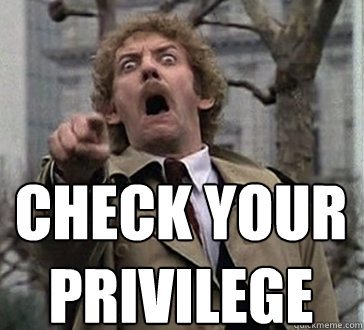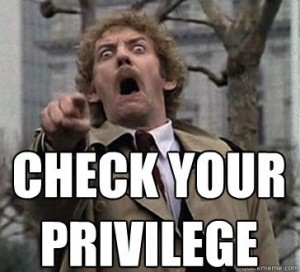How Useful is Privilege Talk?
by Isaac Butler
CUNY Professor Corey Robin writes at Salon today, about how efforts by elite schools to raise awareness about “privilege” is, essentially, a con:
Sometimes, our self-deception can be downright funny. Two weekends ago, the New York Times profiled a group of fancy private schools in New York City where wealthy, white and privileged students learn that they are…wealthy, white and privileged. There’s even an annual “White Privilege Conference,” which is being held this year at Dalton School (tuition: $41,350). More and more private schools, according to the Times, “select students to attend” that conference. These students are so select (and these schools so selective) that they have to be selected to attend a conference on their selectedness.
You’d think that if the parents and teachers of these masters of the universe were truly concerned about racial and class privilege they’d simply abolish private schools. Or lobby for better state and federal laws, and more liberal courts, to reintegrate the public schools: after all, in 1988, even after two terms of Ronald Reagan, even after two decades of a Republican near-monopoly on the White House, racial integration was at an all-time high. That’s how strong the laws and court orders were.
His point, essentially, is that teaching children of privilege about all the privilege they have is, on some level, just paying lip service to social justice. And doing it at a time when the same schools are feeling the effects of mass resegregation is a cruel irony indeed.
Robin’s thoughts are underlined by Freddie DeBoer, who makes the point that Privilege Education is itself a function of privilege. You have to have a certain level of privilege to be taught what “check your privilege” means and what privilege, exactly, you should be checking. Thus engaging in privilege-framed rhetoric can, in some cases, be a way of signaling that you belong to an elite social caste, that, in other words, you have a lot of privilege.
There’s another problem with privilege-talk, however. As our Director of Research Rachel D. Godsil noted on the podcast Point of Inquiry, too heavy a focus on privilege can raise racial anxiety, making real communication and actual anti-racist work harder, not easier:
For some people you can go through the exercise of recognizing that privilege and then move on and still be kind of authentic and not filled with crippling anxiety and guilt when you interact with a person of color, but for a lot of people the checks of privilege or white privilege idea either makes them feel resentful, particularly if they are understood to have white privilege but they are lower middle class or working class where life feels pretty hard and it doesn’t feel like there is a lot of privilege going on. That can cause and trigger resentment among someone who doesn’t in fact have the class privilege particularly when they see someone having class privilege and they don’t feel like that is being recognized as much as white privilege, but even for someone who legitimately could be said to have white privilege, recognizing your privilege alone doesn’t really do any work. Ironically when we’re told to identify white privilege its so that we recognize what we have and that allows us to look beyond ourselves, but I think often its stops with ourselves.
Often, people hear “privilege” not as an observation, but as an accusation designed to dismiss their point of view without considering it. This provokes all kinds of defensive reactions. A quite common one is for the person who is told they are privileged to go through their entire life story (and, perhaps, the lives of their family) to figure out all the ways that they are not privileged. When this happens, the conversation can get totally derailed by a discussion of how much privilege, exactly, a person has.
As Phoebe Maltz Bovy put it in the Atlantic, “There’s always a beat-up used car to be highlighted, a summer home or trust fund to go unmentioned. The self-deprecatory, class-signaling approach might (but rarely does) serve as a first step towards genuine self-examination and, in turn, some broader social-justice commitment. But the main result of privilege talk is scrappiness one-upmanship among the privileged.”
Strategically, if what you’re trying to do is convince someone that you are correct, arguing about someone else’s life story to them is not a conversation that’s going to lead anywhere. You’re certainly not likely to win an argument about someone else’s life story. It’s their life, after all. The most likely outcome is one in which everyone leaves the conversation with their assumptions about each other confirmed and their resentment levels higher than when they came in.
Rachel recommends instead that people focus on what Patricia Devine calls “Breaking the Prejudice Habit.” Rachel recommends this focus because it gets us to focus less on ourselves and more on the other. Or, as Rachel explains it on the podcast, the important thing is:
Recognizing that we often carry these stereotypical associations about people of other groups and think[ing] about how our actions might reflect those. An example might be, a white woman who inadvertently or sort of without even realizing it holds her purse tighter or flinches when an African American man walks by her, to realize that we are doing that… Instead of checking your privilege, check your behavior and then doing the work of identifying counter stereotypic images and ideas and people, hopefully from the world that you live in but not necessarily, a lot of whites continue to live in fairly homogenous environments, so you might need to reach beyond your immediate environment.
Privilege has some (limited) uses, of course. Among like-minded people who already buy into it as a framework for understanding people, it can be an accurate way to describe group dynamics and individual behavior. But as either an argumentative strategy or a coalition-building tool, it has serious drawbacks, as its usual products are not greater understanding of how prejudice works, but rather increased levels of anxiety, resentment, and solipsism.


